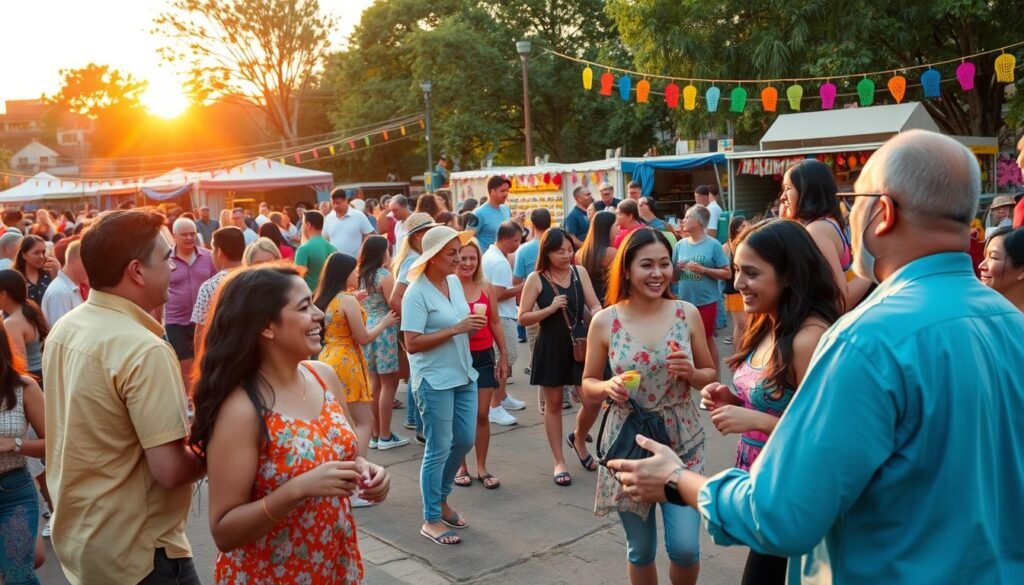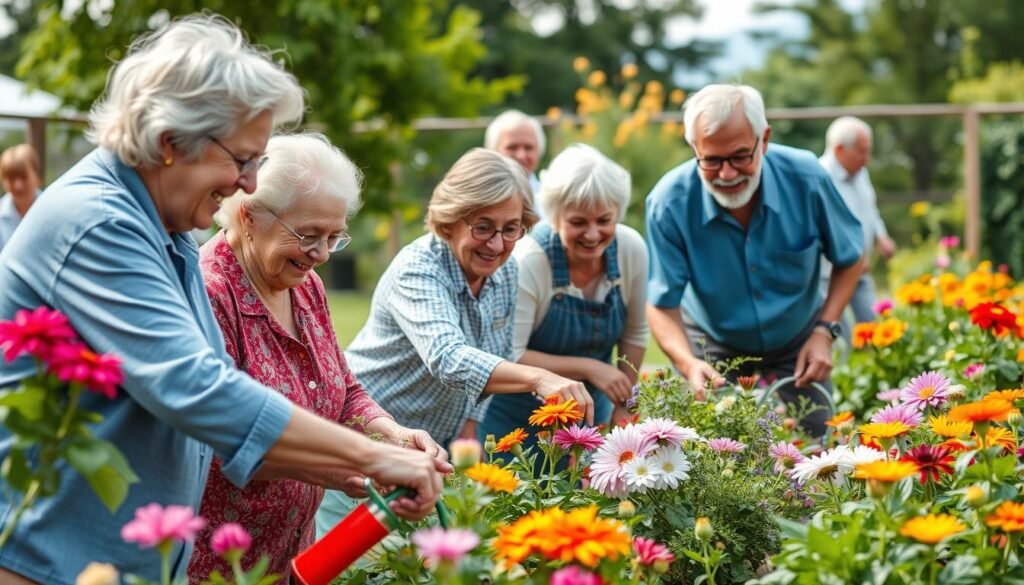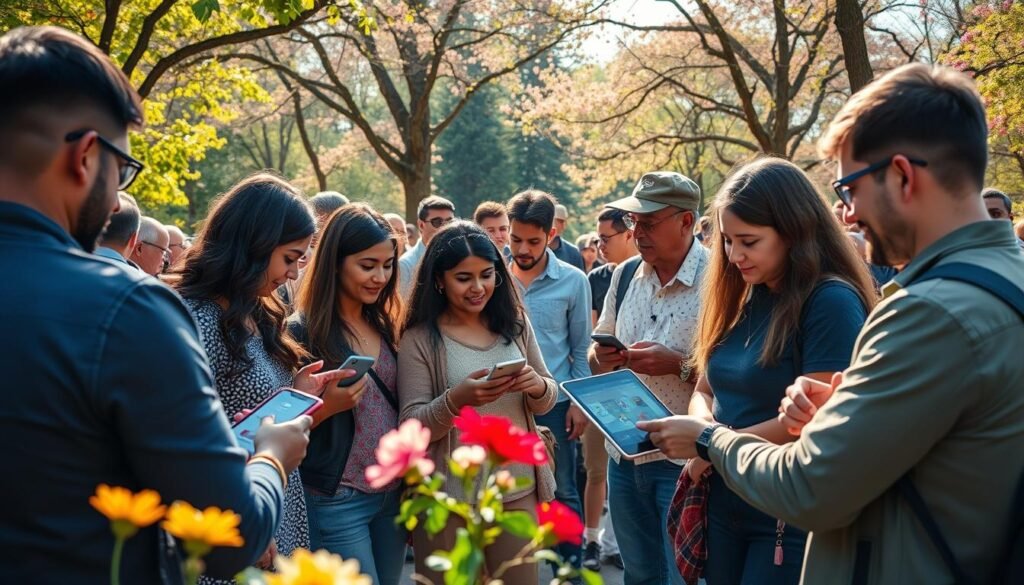A national survey shows that 61 percent of adults in the United States feel lonely. This shows how serious loneliness is and its effect on mental health. With many feeling more anxious and isolated lately, community events are key. They help build connections, fight anxiety, and improve our moods. In today’s world, with health issues, losses, and COVID-19’s lasting effects, the importance of community events is clearer than ever.
Being part of community events can make us feel less alone and support our emotional health. They offer comfort and friendship through activities that match our interests. The importance of connecting with others is clear. It leads to meaningful experiences that make life happier and healthier.
Key Takeaways
- Over 61 percent of adults in the US report feeling lonely.
- Community events play a crucial role in reducing loneliness and isolation.
- Engaging socially can significantly enhance emotional well-being.
- Social connections are vital for combating anxiety.
- Participating in community activities helps create supportive networks.
The Impact of Loneliness on Mental Health
Loneliness is hard on both our minds and bodies. It helps to understand the emotional hurt that comes with feeling alone. This helps us see how it can make some mental health problems worse. People of all ages and walks of life can feel lonely. Studies show it’s a big problem for young people and older adults with health issues.
Understanding the Emotional Pain of Loneliness
Feeling lonely can make you feel sad, anxious, and helpless. Many say this emotional pain is as bad as physical pain. Loneliness can increase depression rates. People feeling lonely often have symptoms similar to depression. Research shows that lonely individuals might struggle with feeling secure in relationships. This makes their emotional challenges even harder.
Loneliness and Physical Health Risks
Loneliness doesn’t just affect our mental health; it also risks our physical health. Studies show that lonely people are more likely to face heart disease, stroke, and dementia. Being lonely can be as bad for your health as smoking 15 cigarettes a day. It can also weaken your immune system. This makes you more prone to getting sick. These facts show how important it is to connect with others.
| Health Risks Associated with Loneliness | Impact on Mental Health | Impact on Physical Health |
|---|---|---|
| Increased risk of depression | 40% increased risk of developing dementia | 30% increased risk of stroke or coronary heart disease |
| Emotional pain resembling physical distress | Heightened feelings of anxiety and sadness | Weakening immune function |
| Chronic loneliness linked to early mortality | Similar effects to major depressive disorders | As detrimental as smoking or obesity |
What is Social Isolation?
Social isolation happens when a person hardly interacts with others or shares meaningful chats. It’s about how often we talk to people and how close we feel to them. Knowing the difference between social isolation and loneliness is key. Social isolation is about actual social interactions, while loneliness is how we feel inside, even around others.
Defining Social Isolation vs. Loneliness
Knowing what sets social isolation and loneliness apart helps us support those in need. Social isolation is about lacking connections. Loneliness is feeling alone, no matter how many people are around. Tools like the Lubben Social Network Scale-6 and the De Jong Gierveld Loneliness Scale shed light on these issues. With 1 in 3 U.S. adults feeling lonely, understanding these terms is vital.
At-Risk Groups for Social Isolation
Certain people are more likely to experience social isolation. Older adults, for example, face more health and mobility challenges. This makes them prone to feeling disconnected. Low-income folks and immigrants also struggle to connect due to various barriers. Young folks feel lonely too, showing age doesn’t fully define this issue. Indeed, 50% of Americans feel lonely, highlighting the widespread nature of this problem.
Reducing Loneliness and Isolation
Community events can dramatically reduce loneliness. They offer chances for making friends and feeling connected. Joining these activities lets people meet others with similar interests.
Connecting Through Community Events
Community gatherings are key in connecting people. Local fairs, workshops, and support groups help form and strengthen bonds. Activities like hobby groups offer a sense of belonging, critical for mental health.
A study showed a decrease in loneliness among adults aged 50 to 80, from 56% in 2020 to 34% in 2023. This highlights how community events can ease loneliness.
The Role of Support Networks
Support networks help individuals heal and reconnect. They encourage participation in community events, providing emotional and practical help. For older adults, this support is vital. With strong networks, they’re more likely to join social activities, improving mental health.
| Statistic | Finding |
|---|---|
| Social Isolation in Older Adults | 1 in 2 adults over 60 are at risk of social isolation. |
| Chronic Loneliness | Comparable to smoking 15 cigarettes daily. |
| Risk of Dementia | Loneliness increases risk by over 30%. |
| Community Engagement | Long-term group activities are effective against isolation. |
Community events and strong support networks help fight loneliness. They create deep, meaningful connections, improving well-being.
Benefits of Community Events on Emotional Well-being
Community events help people connect, improving their emotional health. They offer a chance to learn how to interact better while making new friends. By sharing experiences, people grow in empathy and communication skills.
Enhancing Interpersonal Skills
Joining community events boosts interpersonal skills through various interactions. It’s a way to get better at talking, connecting, and working with others. This can make people more confident in social situations and build important relationships for good emotional health.
Building a Sense of Belonging
Being part of community events makes people feel like they belong. This feeling of connection is key for emotional health and fights anxiety and loneliness. Those who participate in these gatherings see positive changes in their mental health. Bonds formed from these encounters are a buffer against feeling alone. For tips on using social activities to improve mental health, check out more here.

Types of Community Events to Combat Anxiety
Community events help people deal with anxiety and loneliness. They provide ways to meet others, reducing stress. It’s key to know about different events for better well-being.
Volunteer Opportunities
By volunteering, you help causes you care about and meet people with similar interests. This gives a sense of belonging. Studies show those who volunteer feel less lonely because of new friends.
Social Gatherings and Clubs
Social clubs let people bond over common interests like reading or gardening. These activities make people happy and healthy. It shows how being part of a community is good for you.
Workshops and Educational Programs
Educational workshops offer a chance to learn with others. This can boost your brain health and help you make friends. To learn more about community events and mental health, click here.
| Type of Community Event | Benefits |
|---|---|
| Volunteer Opportunities | Fosters a sense of purpose and lowers feelings of loneliness. |
| Social Gatherings and Clubs | Encourages connections through shared interests, enhancing happiness. |
| Workshops and Educational Programs | Improves cognitive functions while building a supportive environment. |
The Importance of Healthy Aging
Healthy aging keeps the mind and heart young as we grow older. Being active in your town or city boosts your life quality. Joining in local events or groups has many pluses for seniors.
Doing things that matter can fight off loneliness. It also makes you happier, giving a sense of achievement and belonging.
Staying Active in the Community
Getting into community stuff keeps older people lively. Staying regularly active helps with staying fit, important for aging well. Joining classes or sports improves strength, balance, and heart health.
Being part of a community helps make friends. This is key for feeling good mentally.
Engaging in Purposeful Activities
Activities with a purpose help beat loneliness and build emotional strength. This includes volunteering, book clubs, or art classes. Spending time on meaningful pursuits gives a feeling of success.
Experts say this lowers stress and sadness. The National Institute on Aging shows small steps can make a big difference in being happy. Learn more about aging well at what we know about healthy aging.

How Volunteering Can Alleviate Loneliness
Volunteering is a powerful way to fight loneliness. It lets you give back and make new friends. This brings joy and builds community.
Giving Back and Gaining Connection
Volunteering helps you do good for others and connect with people. It brings people with similar interests together. This creates a sense of belonging.
Over 62% of people surveyed have been volunteering for more than ten years. They are dedicated to helping and connecting with others. This commitment leads to friendships that lessen loneliness.
Creating Lasting Friendships Through Service
Volunteering can turn new relationships into lasting friendships. Working for a common cause helps bonds grow. Studies show these friendships can make us feel less lonely.
Such relationships give us support against isolation. By continuing to volunteer, we create strong bonds. These ties improve our life and happiness.
Technology and Community Connection
Technology is key for better community ties, especially when alone. We now lean on digital ways to stay in touch. This includes social media, where virtual meet-ups happen often. These online gatherings allow for social engagement without meeting face-to-face.
Using Social Media for Connection
Social media is vital for keeping people connected. It helps share moments and support between friends and family, no matter the distance. For the elderly, social media is a bridge to others. It brings more communication and a sense of belonging. By diving into technology in community connection, we find ways to build bonds and fight off loneliness. Being active online can make us feel part of a bigger world.
Online Community Events During Isolation
With the pandemic, online events have become more common. They offer a social escape for those stuck at home. Many organizations now host online events for all interests. These range from learning sessions to fun online meet-ups. Joining these can spark new friendships and lessen isolation. Studies prove tech like video calls are great for creating connections. Leveraging technology helps enhance our social life, even in hard times.

Success Stories: Overcoming Loneliness Through Community Engagement
Real-life stories show great changes from community involvement. People who once felt alone found friendship by joining local gatherings. These Success Stories tell of personal growth. They show how getting involved in community events can make you feel happier.
Personal Accounts of Transformation
Many say joining community projects changed how they see loneliness. For example, volunteering gives a purpose and creates strong bonds. This leads to feeling part of something bigger. It shows us that Overcoming Loneliness is possible when we work together. Sharing stories encourages others to also get involved in their communities.
The Ripple Effect of Community Events
Being part of community events does a lot of good. When people join activities like fitness groups or book clubs, friendships grow. This not only benefits them personally but also strengthens the community. A support network forms, focusing on mental health. It shows that joining local activities builds solid social connections, fighting loneliness.
| Community Engagement Activity | Benefits of Participation |
|---|---|
| Volunteer Work | Fosters purpose, connection, and empathy |
| Group Workouts | Improves physical health and reduces loneliness |
| Book Clubs | Encourages social interaction and intellectual growth |
| Recreational Sports | Builds teamwork and enhances friendships |
| Local Events | Increases community cohesion and well-being |
Conclusion
Exploring community events shows they’re key in fighting loneliness and boosting happiness. Making friends is crucial, especially when many feel left out. Being part of community activities helps beat stress and build a network of support.
Groups like Age UK and the Campaign to End Loneliness point out that isolation affects lots of people. It harms health and life quality. Getting involved in community events opens the door to meet people and form stronger support circles. Active involvement is a strong way to tackle loneliness.
Many initiatives and studies prove that adding community events to daily life has great benefits. The struggle with feeling isolated needs ongoing action to boost community ties. For deep insights on this topic, check out the thorough review here. It talks about ways to make elderly people feel happier and less lonely.